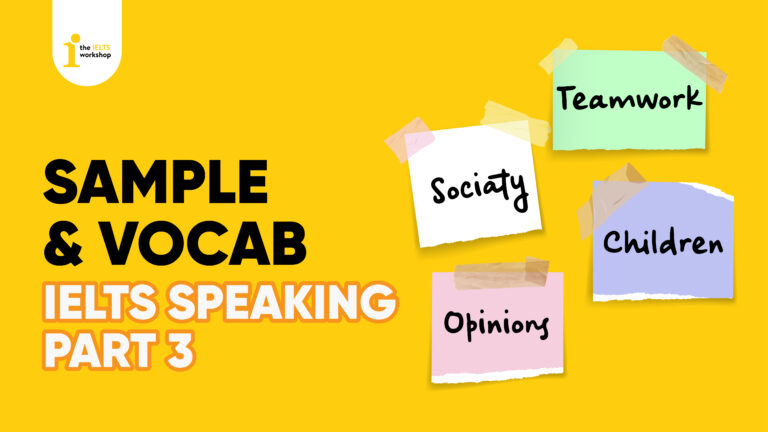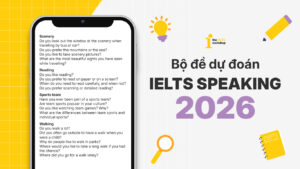Trong IELTS Speaking Part 3, giám khảo sẽ hỏi bạn những câu hỏi về chủ đề dựa trên nội dung của phần thi trước là IELTS Speaking Part 2. Trong phần thi này, giám khảo sẽ chấm điểm dựa trên cách diễn đạt ý kiến, suy nghĩ của bạn một cách rõ ràng và mạch lạc. Dưới đây là các chủ đề phổ biến kèm bài mẫu thường gặp được The IELTS Workshop (TIW) giới thiệu trong bài viết này. Bạn có thể tham khảo câu trả lời mẫu cho từng chủ đề nhé.
I. Các chủ đề phổ biến trong IELTS Speaking Part 3
Family
In what ways have families in your country changed in recent years?
What role do grandparents have in the family in your country?
What do you think about single-parent families?
How do you think the family will change in the future?
Who do you think should be responsible for the care of the elderly, the family or the government?
Why is the number of joint families decreasing in modern time?
Society
What social problems are there in your country?
What can be done to alleviate poverty?
What do you think of social charity?
What is the difference between minor crimes and major crimes?
House & Apartment
What kind of apartment is the most popular in your country?
What is the difference between the houses that young people and old people live in?
What are the differences between houses and apartments?
Do people usually buy or rent a house? Why?
Sample Answer – House & Apartment
Happiness
How important is money to our happiness?
Do you think we feel happy when we make other people happy?
Are we responsible for other people’s happiness?
Some people say the happiest time in people’s lives is the period when they are at school? Do you agree?
Do you think people were happier in the past than they are now?
Do you think there’s any relationship between a person’s age and their level of happiness?
Creativity
Do you think you are a creative person?
Is it good for children to learn arts?
What kinds of jobs require people to be creative?
Do you think leaders need to have creative ability?
Business
What do you think is the retirement age for men and women?
Why do some people want to start their own business?
What kinds of qualities do people need to run their own business?
What do you think are the key factors that contribute to the success of a business?
Opinions/Ideas
At what age should children have their own decisions/opinions?
What are the benefits when children have their own ideas/opinions?
What are the responsibilities of teachers in helping children develop their ideas/opinions?
Do you think children are taught to have the same ideas with their parents?
Movie
Are films a waste of money?
Are movie stars important to a movie?
Are foreign movies popular in Vietnam?
Is it important that a country has its own movies?
Teamwork
Do you think people enjoy doing things in groups?
Can you tell me about different jobs that people do either themselves or do in groups?
Do you think some people don’t like each other in the workplace? Why?
What personalities should a good leader have?
Purchase
Why are children attracted to new things (such as electronics)?
Why do some grown-ups hate to throw out old things (such as clothes)?
Is the way people buy things affected? How?
What do you think influences people to buy new things?
Saving Time
What can people do to save time?
Does technology help people save time? How and why?
Do you think parents should be responsible for teaching children to save time?
Do people who can manage time well become successful more easily?
Memory
Why do some people have better memory?
Do people like things of memorial significance?
Which can help people remember things better, words or photos?
Can technology help people remember things better? How?
Advertisement
When should parents encourage their children?
Should parents always encourage their children?
Do you think negative feedback is more important than positive feedback? Why?
Why is negative feedback as important as positive feedback at work or in study?
Cellphone
What do you usually do with a cellphone?
What are the differences between young people and old people when using a cellphone?
Which one is more important, using a cellphone to make phone calls or to read messages?
Do you think there should be a law to stop people from making phone calls in public?
Traffic Jam
How can we solve the traffic jam problem?
Do you think developing public transport can solve traffic jam problems?
Do you think the highways will help reduce traffic jams?
What are good ways to manage traffic?
Are IT-related jobs valued more by society?
Is the quality of products worse than before?
What kinds of things do people like to repair by themselves?
Why do people like to get their mobile phones repaired in specialized stores?
Sample Answer – IT-related Jobs
Traditional Products
Why are traditional products important?
Do you think tradition is important for a country? Why?
What are the traditional Vietnamese products?
Why is it important for children to learn about traditional products?
Sample Answer – Traditional Products
Mid-Autumn
What is the Mid-Autumn Festival in Vietnam?
When is the Mid-Autumn Festival held in Vietnam?
Where are the best destinations in Vietnam to enjoy this festival?
Do you like the Mid-Autumn Festival? Why or Why not?
Advertisement
Why do some people hate advertisements?
Do people usually buy stuff after watching advertisements?
Is music useful in advertising?
Childhood
Why do people always miss their childhood?
Are kids happier than adults? Why?
Why do people still remember many of their childhood friends?
City
Where do people like to live in your country?
Why do many people move to the city?
What are the advantages of living close to the workplace?
What kind of place do older people prefer to live in?
River & Lake
How can lakes benefit local people?
Do you think rivers attract tourists?
How do rivers/lakes affect local tourism?
Are rivers/lakes good for transport? Why?
Decision making
What kinds of decisions do young people have to make?
Do you think young people are easily influenced by others while they make decisions? Why or why not?
Do you think some people can make decisions without asking for advice from others?
Do you think it’s necessary for kids to make as many decisions by themselves as they can?
Sample Answer – Decision making
Music
Why are many music competitions popular in Vietnam?
What kinds of music do young people like?
What kinds of people like traditional music?
What are the differences between live concert and online concert?
What kind of music do people like at different ages?
What kind of music is popular in your country now and what kind will be in the future?
Do parents in your country require their children to learn and to play musical instruments?
Why do some people like to listen to live music while others prefer CDs?
Concentration
Why is it more difficult for children to concentrate nowadays than in the past?
Do you think technology will harm children’s ability to concentrate?
What kinds of jobs require high concentration at work?
Can exercise help people improve concentration?
Leisure Time
Do people like to spend their leisure time out in your country?
How do people spend their leisure time in your country?
How does technology affect the way people spend their leisure time?
Do you think only old people have time for leisure?
Tham khảo các bài mẫu IELTS Speaking được làm bởi đội ngũ của TIW:
- Bộ đề dự đoán IELTS Speaking – Full 3 Parts mới nhất
- 30+ bài mẫu IELTS Speaking Part 1 theo chủ đề
- Trọn bộ 30+ bài mẫu IELTS Speaking Part 2
II. Tips ứng phó khi gặp câu hỏi khó ở Speaking IELTS Part 3
Speaking Part 3 luôn là một thử thách lớn đối các sĩ tử IELTS. Bài thi yêu cầu thí sinh không chỉ giỏi kiến thức, mà còn cần đủ bản lĩnh khi đối diện với đề thi và giám khảo. Đứng trước những câu hỏi khó trong IELTS Speaking Part 3, bạn có thể làm cách gì để trả lời? Dưới dây là những cách xử lý các tình huống khó trong phần thi IELTS Speaking Part 3 rất hữu ích mà bạn có thể áp dụng.
Hỏi lại khi không rõ câu hỏi
Đôi khi thí sinh không hiểu rõ câu hỏi mà giám khảo đưa ra thì khi đó thí sinh chỉ cần yêu cầu giám khảo nhắc lại câu hỏi, hay nói cách khác là “rephrase” lại câu hỏi để có thể hiểu được câu hỏi rõ ràng hơn.
Nếu không hiểu giám khảo đang hỏi gì, hãy yêu cầu lịch sự giám khảo bằng câu hỏi dưới dây
Can you rephrase the question? (Anh/chị có thể diễn đạt lại câu hỏi này được không?)
Nhờ câu hỏi này, giám khảo có thể diễn đạt câu hỏi một cách đơn giản hơn từ đó bạn có thể hiểu và trả lời được.
Bình luận về câu hỏi
Khi gặp một câu hỏi khó mà bạn chưa thể nghĩ ra câu trả lời ở part 3, bạn có thể. để bạn có thêm thời gian nghĩ thêm về các ý tưởng, câu trả lời. Các câu bạn có thể áp dụng trong trường hợp này:
- That’s a very interesting question (Câu này hay quá anh/chị ạ)
- I’ve never thought about this before (Em chưa bao giờ nghĩ về cái đề tài này cả!)
Tiếp theo bạn có thể nói về cảm xúc của bạn hoặc sự thật về những điều bạn chưa biết như
- To be honest I don’t know the first thing about the global warming and I know even less about architect. (Thật lòng mà nói em không biết nhiều về hiện tượng nóng lên toàn cầu và thậm chí còn biết ít hơn về kiến trúc.)
- I have to admit that I don’t know much about technologyy, so it’s really difficult for me to give the exact answer to this question. (Em phải thừa nhận rằng em không biết nhiều về công nghệ, vì vậy thật khó để em có thể đưa ra câu trả lời chính xác cho câu hỏi này.)
Nói chung chung (Give a general answer)
Sau khi thực hiện 2 cách trên mà bạn vẫn chưa nghĩ ra ý tưởng gì để trả lời, điều tốt nhất bạn có thể làm lúc này là đưa ra một câu trả lời khái quát.
Ví dụ:
Is advertising harmful to viewers? (Quảng cáo có hại tới người xem không?)
Nếu chưa nghĩ đươc một tác hại nào cụ thể, bạn có thể nói chung chung là “Có rất nhiều tác hại” trước:
Well, you know, there is a lot of harm from watching advertisements. (Vâng thì, anh/chị biết đấy, chắc chắn có rất nhiều tác hại từ việc xem quảng cáo)
Trên đây là tổng hợp các chủ đề quan trọng trong IELTS Speaking Part 3. Hy vọng The IELTS Workshop đã mang đến cho bạn các thông tin hữu ích để chuẩn bị cho kỳ luyện thi IELTS của mình. Ngoài ra, bạn có thể tham khảo phương pháp xây dựng câu trả lời hoàn chỉnh cho phần thi IELTS Speaking tại khóa học IELTS Senior của The IELTS Workshop.









